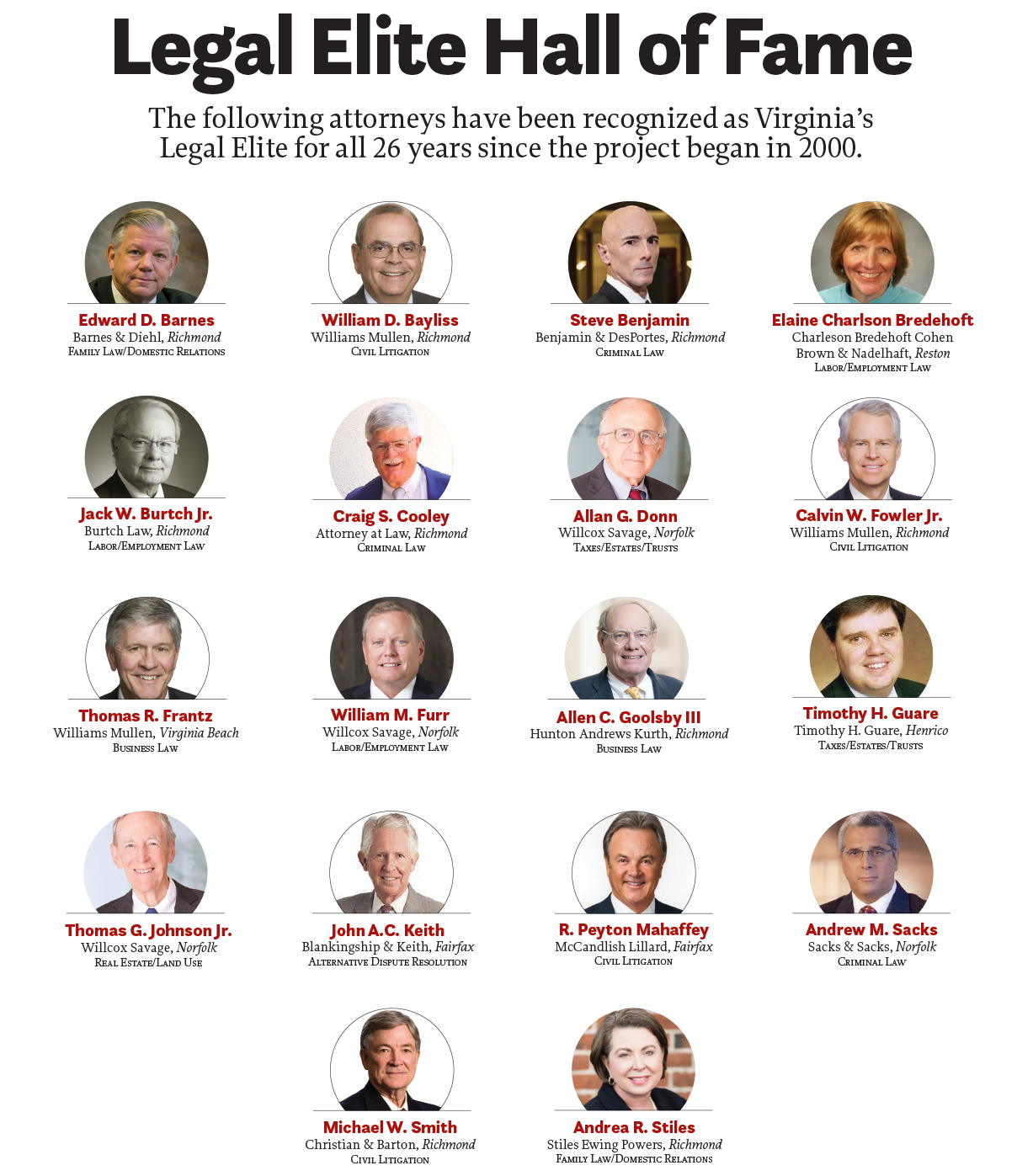Christopher A. Abel
Willcox Savage
Norfolk
George T. Albiston
Albiston Brannon & Gilbert
Norfolk
Phillip V. Anderson
Frith Anderson + Peake
Roanoke
Bruce Edwin Arkema
Durrette, Arkema, Gerson & Gill
Richmond
David Armistead
Carluzzo Rochkind & Smith
Manassas
David L. Arnold
Pender & Coward
Virginia Beach
Edward Everett Bagnell Jr.
Spotts Fain
Richmond
John Baker
Cooper Hurley Injury Lawyers
Norfolk
William D. Bayliss
Williams Mullen
Richmond
D. Cameron Beck Jr.
McCandlish Holton
Richmond
Andrew Biondi
Sands Anderson
Richmond
Bruce T. Bishop
Willcox Savage
Norfolk
Jonathan T. Blank
McGuireWoods
Charlottesville
Candace Ali Blydenburgh
McGuireWoods
Richmond
Ed Booth
Booth Law
Virginia Beach
Stacie C. Bordick
Hirschler
Fredericksburg
Jason A. Botkins
Litten & Sipe
Harrisonburg
George H. Bowles
Williams Mullen
Virginia Beach
Amy L. Bradley
Blankingship & Keith
Fairfax
Sean Breit-Rupe
ThompsonMcMullan
Richmond
Les Brock
Merrick Brock
Henrico County
Jeffrey F. Brooke
Poole Brooke Plumlee
Virginia Beach
Turner A. Broughton
Williams Mullen
Richmond
David G. Browne
Spiro & Browne
Glen Allen
Gary A. Bryant
Willcox Savage
Norfolk
Elliott M. Buckner
Cantor Grana Buckner Bucci
Henrico County
John S. Buford
Hancock Daniel
Glen Allen
L. Lee Byrd
Sands Anderson
Richmond
Sean P. Byrne
Byrne Canaan Law
Richmond
Edward W. Cameron
Cameron Ingersoll Roche
Fairfax County
Dabney Carr
Troutman Pepper Locke
Richmond
Stephen D. Caruso
Bean Kinney & Korman
Arlington County
James L. Chapman IV
Crenshaw, Ware & Martin
Norfolk
Zachary L. Chapman
Shannon & Wright
Alexandria
A. William Charters
Goodman Allen Donnelly
Norfolk
Mallory Chesney
Red Quill Law
Hanover County
Linda Choe
Abrenio Choe
Fairfax
Andrew K. Clark
Hirschler
Richmond
Eric D. Cook
Willcox Savage
Norfolk
John M. Cooper
Cooper Hurley Injury Lawyers
Norfolk
David P. Corrigan
Harman Claytor Corrigan & Wellman
Glen Allen
Anthony S. Cottone
Byrne Canaan Law
Richmond
Graven Craig
CraigWilliams
Louisa County
Alan B. Croft
McCandlish Lillard
Fairfax
James A.L. Daniel
Daniel, Medley & Kirby
Danville
Christopher Davis
Davis, Burch & Abrams
Chesapeake
Justin D. deBettencourt
Reed Smith
McLean
Katie M. DeCoster
Sands Anderson
Christiansburg
Raighne C. Delaney
Bean Kinney & Korman
Arlington County
Michael E. Derdeyn
Flora Pettit
Charlottesville
Rodney S. Dillman
Dillman Legal Group
Virginia Beach
Barry Dorans
Wolcott Rivers Gates
Virginia Beach
Tracie M. Dorfman
Hancock Daniel
Fairfax County
Sandra M. Douglas
Hancock Daniel
Glen Allen
Lisa Kent Duley
Harman Claytor Corrigan & Wellman
Glen Allen
Andrea Dunlap
Crenshaw, Ware & Martin
Norfolk
Broderick C. Dunn
Dunn Craig & Francuzenko
Fairfax County
Lawrence A. Dunn
McCandlish Holton
Richmond
Carl A. Eason
Wolcott Rivers Gates
Virginia Beach
Lauren Ellerman
Frith & Ellerman Law Firm
Roanoke
John M. Erbach
Spotts Fain
Richmond
Hugh M. Fain III
Spotts Fain
Richmond
Stephen M. Faraci Sr.
Whiteford Taylor & Preston
Richmond
Lauren P. Farrar
Odin Feldman Pittleman
Reston
Justin S. Feinman
Williams Mullen
Richmond
Ryan Ferguson
Office of the Attorney General of Virginia
Richmond
M. Scott Fisher Jr.
Friedman Fisher Verity
Richmond
Matthew A. Fitzgerald
McGuireWoods
Richmond
Cindy S. Foster
Harman Claytor Corrigan & Wellman
Glen Allen
Calvin W. Fowler Jr.
Williams Mullen
Richmond
Paulo E. Franco Jr.
Thompson McMullan
Richmond
Christian B. Franklin
Parrish Snead Franklin Simpson
Fredericksburg
Bryan A. Fratkin
McGuireWoods
Richmond
Ryan D. Frei
McGuireWoods
Richmond
Daniel Frith
Frith & Ellerman Law Firm
Roanoke
Brent R. Gary
Holland & Knight
Tysons
Jeffrey H. Geiger
Sands Anderson
Richmond
Sandra Chinn Gilstrap
Chinn Gilstrap Law
Danville
Danielle D. Giroux
Harman Claytor Corrigan & Wellman
Alexandria
David J. Gogal
Blankingship & Keith
Fairfax
Jessica Golden
Kalbaugh Pfund & Messersmith
Chesterfield County
Michael Goodove
Swartz Taliaferro Goodove & Ufkes
Norfolk
Brandan M. Goodwin
Kaufman & Canoles
Norfolk
Stephanie E. Grana
Cantor Grana Buckner Bucci
Henrico County
Terrence L. Graves
Sands Anderson
Richmond
Jeffrey H. Gray
Pender & Coward
Virginia Beach
Marc C. Greco
Glasser and Glasser
Norfolk
Matthew D. Green
Sands Anderson
Richmond
Rebekah S. Green
Altmiller Melnick Demers
Steele & Rosati
Tysons
Kevin P. Greene
Willcox Savage
Norfolk
Alicha M. Grubb
Gentry Locke Attorneys
Roanoke
Imie Aisiku Harber
McCandlish Holton
Richmond
Kip A. Harbison
Glasser and Glasser
Norfolk
Warren David Harless
Christian & Barton
Richmond
Meredith M. Haynes
Williams Mullen
Richmond
David W. Hearn
Sands Anderson
Richmond
Brett C. Herbert
Whiteford Taylor & Preston
Richmond
Robert T. Hicks
Bean Kinney & Korman
Arlington County
Adam R. Hill
PJI Law
Fairfax
Braxton Hill
Kaleo Legal
Virginia Beach
Charles F. Hilton
Wharton Aldhizer & Weaver
Harrisonburg
Kevin Walker Holt
Gentry Locke Attorneys
Roanoke
Richard Dean Holzheimer Jr.
McGuireWoods
Tysons
David D. Hudgins
Dunton, Simmons & Dunton
White Stone
Jeffrey A. Hunn
Pender & Coward
Virginia Beach
Jim Hurley
Cooper Hurley Injury Lawyers
Norfolk
James R. Jebo
Harman Claytor Corrigan & Wellman
Glen Allen
Harold E. Johnson
Williams Mullen
Richmond
R. Christopher Jones
Allen, Allen, Allen & Allen
Petersburg
Karissa T. Kaseorg
Sands Anderson
Richmond
Matthias Kaseorg
Pierce Jewett
Richmond
Samuel Kaufman
Owen & Owens
Midlothian
Allyson Kitchel
Kitchel Injury Law
Washington, D.C.
Steven A. Krieger
Steven Krieger Law
Arlington County
Scott Krystiniak
Wolcott Rivers Gates
Virginia Beach
Kari J. La Fratta
Allen, Allen, Allen & Allen
Charlottesville
Michael E. Lacy
Troutman Pepper Locke
Richmond
Anne C. Lahren
Pender & Coward
Virginia Beach
Katherine Lennon Ellis
Woods Rogers
Norfolk
Neal H. Lewis
Hancock Daniel
Johnson City, Tenn.
Laura Golden Liff
Miles & Stockbridge
Tysons
Stephen David Lofaso
Vanderpool Frostick & Nishanian
Manassas
Robert W. Loftin
McGuireWoods
Richmond
Mark D. Loftis
Woods Rogers
Roanoke
C. Dewayne Lonas
Moran Reeves & Conn
Richmond
Katherine C. Londos
Frith Anderson + Peake
Roanoke
Joshua F.P. Long
Woods Rogers
Roanoke
Matthew Long
Bowen Ten Long & Bal
Henrico County
John C. Lynch
Troutman Pepper Locke
Virginia Beach
R. Peyton Mahaffey
McCandlish Lillard
Fairfax
Christopher M. Malone
ThompsonMcMullan
Richmond
Brad Marrs
Marrs & Henry Law Firm
Richmond
Laura Maughan
Sands Anderson
Richmond
Julie C. Mayer
Dillman Legal Group
Virginia Beach
Lawrence J. McClafferty
McCandlish Lillard
Fairfax
Joel R. McClellan
Marks & Harrison
Henrico County
Robert W. McFarland
McGuireWoods
Norfolk
John D. McGavin
McGavin Boyce Bardot
Thorsen & Katz
Fairfax
Thomas John McKee Jr.
Greenberg Traurig
McLean
Matthew D. Meadows
Gordon Rees Scully Mansukhani
Williamsburg
John Merrick
Merrick Brock
Henrico County
John Messersmith
Kalbaugh Pfund & Messersmith
Chesterfield County
Juliane C. Miller
Harman Claytor Corrigan & Wellman
Alexandria
William H. Monroe Jr.
Glasser and Glasser
Norfolk
Michael A. Montgomery
Eckert Seamans Cherin & Mellott
Richmond
Chad A. Mooney
PLDR Law
Lynchburg
Joseph P. Moriarty
Willcox Savage
Norfolk
John B. Mumford Jr.
Hancock Daniel
Glen Allen
Christy L. Murphy
Bischoff Martingayle
Norfolk
Mark C. Nanavati
Sinnott Nuckols & Logan
Midlothian
Jon A. Nichols
Harman Claytor Corrigan & Wellman
Glen Allen
Lonnie D. Nunley III
Hunton Andrews Kurth
Richmond
Griffin O’Hanlon
Cooper Hurley Injury Lawyers
Norfolk
John P. O’Malley
Williams Mullen
Richmond
Bill O’Mara
Cooper Hurley Injury Lawyers
Norfolk
Brendan O’Toole
Williams Mullen
Richmond
John R. Owen
Harman Claytor Corrigan & Wellman
Glen Allen
W. Benjamin Pace
Williams Mullen
Richmond
Julie S. Palmer
Harman Claytor Corrigan & Wellman
Glen Allen
Jennifer Lee Parrish
Parrish Snead Franklin Simpson
Fredericksburg
Elizabeth Payne-Maddalena
Berenzweig Leonard
Tysons
John E. Peterson Jr.
Hancock Daniel
Glen Allen
Stephen Pierce
Surovell Isaacs & Levy
Fairfax
Douglas E. Pittman
Reed Smith
Richmond
Jeffrey S. Poretz
Miles & Stockbridge
Tysons
Juli M. Porto
Blankingship & Keith
Fairfax
Benjamin R. Rand
Blackburn, Conte, Schilling & Click
Richmond
Gary Reinhardt
Kalbaugh Pfund & Messersmith
Chesterfield County
Brian A. Richardson
Ford Richardson
Richmond
Rebecca Roberts
Moran Reeves & Conn
Richmond
Glen Michael Robertson
Wolcott Rivers Gates
Virginia Beach
David C. Rohrbach
Rohrbach Rosenthal
Alexandria
Olga Rollins
Ernest Law Group
Virginia Beach
J. Benjamin Rottenborn
Woods Rogers
Roanoke
Daniel Royce
Kalbaugh Pfund & Messersmith
Chesterfield County
Julia A. Rust
Williams Mullen
Virginia Beach
John F. Sawyer
Wolcott Rivers Gates
Virginia Beach
Nathan H. Schnetzler
Frith Anderson + Peake
Roanoke
Carl R. Schwertz
Miles & Stockbridge
Richmond
Cullen D. Seltzer
Sands Anderson
Richmond
John C. Shea
Marks & Harrison
Henrico County
Justin E. Simmons
Woods Rogers
Roanoke
Jodi B. Simopoulos
Mitchell Simopoulos & Fattoum
Richmond
Randy Singer
Singer Hoffman
Virginia Beach
Victor S. Skaff III
Glenn Robinson Cathey Skaff & White
Roanoke
Elizabeth S. Skilling
Harman Claytor Corrigan & Wellman
Glen Allen
Michael W. Smith
Christian & Barton
Richmond
James M. Snyder
McCandlish Holton
Richmond
Brett A. Spain
Willcox Savage
Norfolk
Henry C. Spalding III
Thompson McMullan
Richmond
W. Edgar Spivey
Kaufman & Canoles
Norfolk
Heather R. Steele
Altmiller Melnick Demers Steele & Rosati
Tysons
Robert J. Stoney
Blankingship & Keith
Fairfax
Dan Sullivan
Newton & Sullivan Law
Roanoke
John H. Taylor
FloranceGordonBrown
Richmond
C. Walker Terry
Byrne Canaan Law
Richmond
Benjamin J. Trichilo
McCandlish Lillard
Fairfax
William W. Tunner
ThompsonMcMullan
Richmond
Clint W. Verity
Friedman Fisher Verity
Richmond
Brian A. Wainger
Kaleo Legal
Virginia Beach
John R. Walk
Hirschler
Richmond
Ryan T. Walker
Marks & Harrison
Henrico County
Stanley P. Wellman
Harman Claytor Corrigan & Wellman
Glen Allen
Britton R. Wight
Harman Claytor Corrigan & Wellman
Alexandria
Henry I. Willett III
Christian & Barton
Richmond
Gillian Williston
Troutman Pepper Locke
Virginia Beach
Marshall A. Winslow Jr.
Pender & Coward
Virginia Beach
Rachel Yates
Yates Appellate Law
Henrico County
Dickson J. Young
Whitestone Young
Fairfax
Robert J. Zelnick
Vanderpool Frostick & Nishanian
Manassas
Alison R. Zizzo
Midgett Preti Olansen
Virginia Beach













 CHRIS TURNBULL
CHRIS TURNBULL